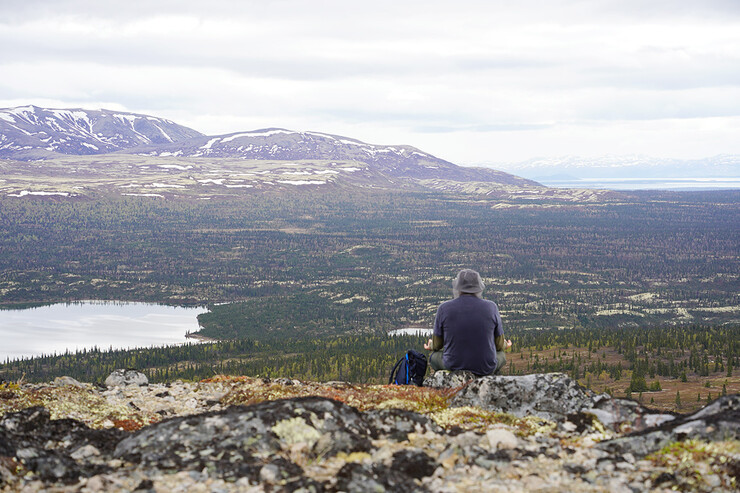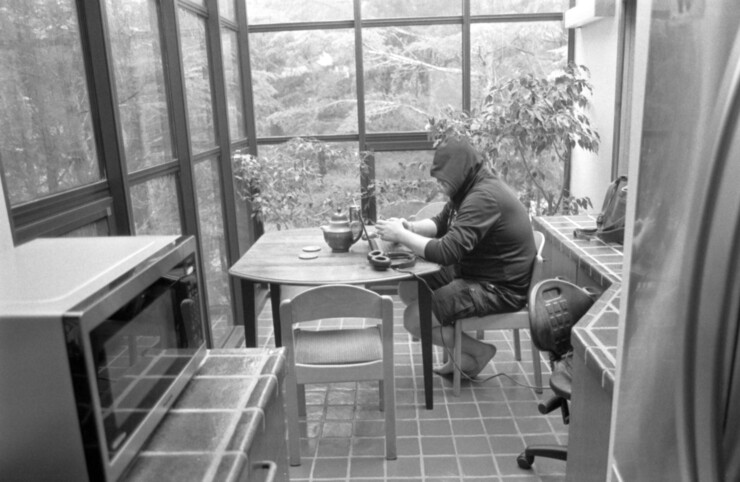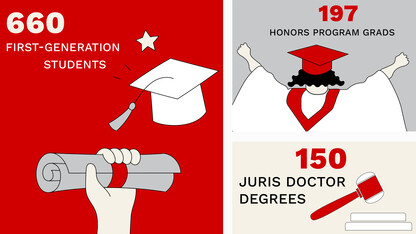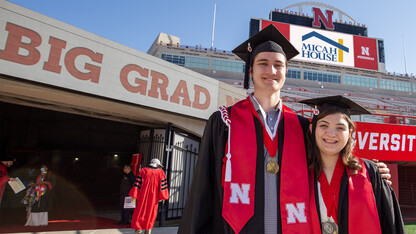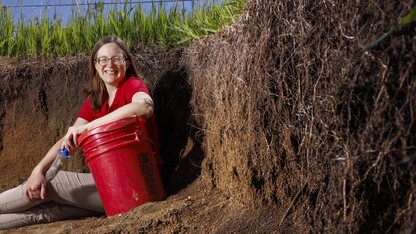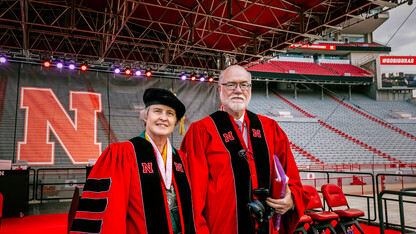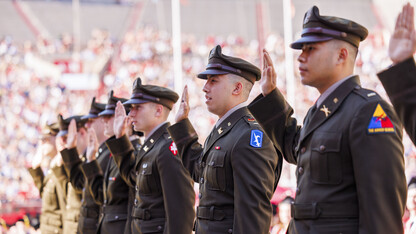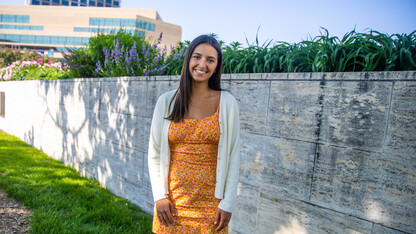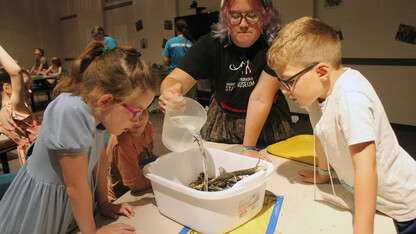· 6 min read
Frost braves wilderness for music experience of a lifetime
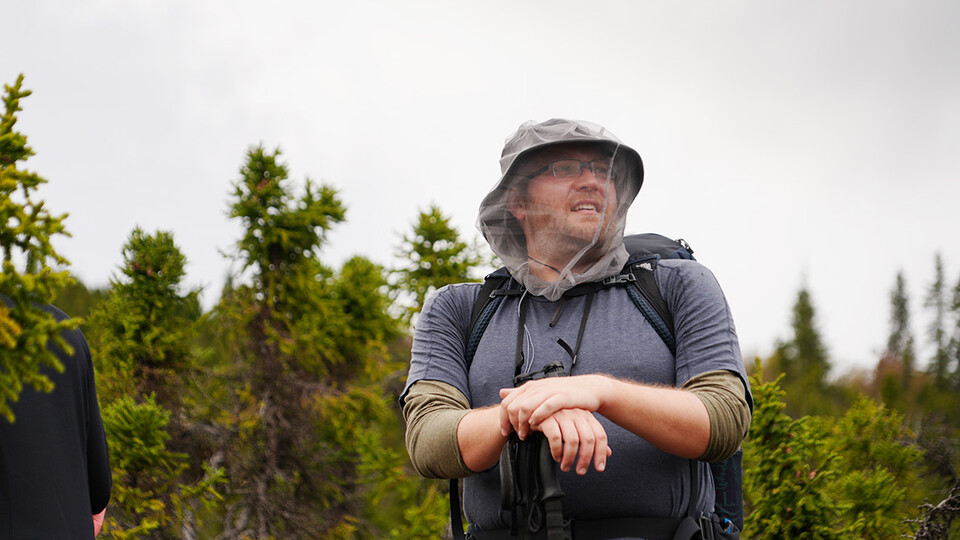
Composer, teacher and performer Trevor Frost left for an organized Alaskan wilderness experience at the beginning of June and came back inspired and full of growth.
Frost, a second-year Doctor of Musical Arts student at the University of Nebraska–Lincoln’s Glenn Korff School of Music, was one of six composers who completed the “Composing in the Wilderness” program in Alaska at Lake Clark National Park.
“It was life changing,” Frost said. “It was one of those once in a lifetime opportunities and I thought ‘I need to do this.’ It was physically the hardest thing I’ve ever done in my entire life.”
The composers spent 10 total days in the wilderness of Alaska to gather inspiration to compose wind ensemble pieces that will be premiered in 2024, by three university wind ensembles in the United States.
The “Composing in the Wilderness” program is led by Stephen Lias, adventurer-composer, and is offered by the Fairbanks Summer Arts Festival in collaboration with Alaska Geographic and the National Park Service. Only six composers, including Frost, were selected for this program out of 23 applicants.
“Living in the wilderness of Alaska, there is nothing quite like it,” Frost said. “Being from New Hampshire, we have forests and mountains, but there is nothing that compares to that. The lake that we went to was the most remote place I have ever been in my entire life.”
Frost first heard about the opportunity at the Midwest Clinic in Chicago in December 2021, where he attended as an exhibitor to recruit for the Korff school. He stumbled upon Lias’ booth with information about the program.
“Right then and there I was interested in applying, just because I like being out in nature,” he said. “I would go camping with my parents all the time when I was younger.”
The group flew a bush plane from Anchorage to Port Alsworth, which is a tiny port town. From there, they took three float planes to the lake where they were staying.
“They dropped us off and were like ‘okay, see you in five days,’’’ Frost said. “It was very surreal and just having that opportunity to be living in the wilderness for five days is nothing that you’ve ever experienced before. It’s something that I’ll never forget.”
They hiked and kayaked to different places for five days. After five days of camping, the group rented a house and spent three nights there. It was their time to start putting ideas to paper for their wind ensemble pieces.
“I spent that first day in the house with my hood up and writing in the kitchen area,” Frost said. “Some of the other composers would take breaks and they would come over to me and ask me to do something to get out of the house a little bit, and I felt bad because that first day I felt very focused and into what I was doing, and ideas kept coming to my head and I was like, ‘I can’t right now, I really just gotta write this down.’ If I didn’t write my thoughts down then, I was going to forget.”
The group has until Jan. 1 to finish the pieces they are writing. At that time, they will give the scores and parts to Lias and he will distribute them to the premiering ensembles. Among them is the Glenn Korff School of Music’s Wind Ensemble. The Stephen F. Austin Wind Ensemble at Texas and the Grand Valley State University Wind Symphony in Michigan will also premiere the pieces.
Each composer is writing one piece, which will form the program for the concert. To avoid similar moods and styles of pieces, each composer was given a prompt the first night of living in the wilderness.
“For example, my prompt was ‘write a six minute light, humorous, playful piece for a grade four.’ Another composer would write ‘a dark, violent work for a wind ensemble that is eight minutes long,’” Frost said. “When I got the prompt ‘light, humorous and playful,’ the problem was I didn’t view that place as humorous or playful at all. I was thinking ‘how am I going to do this?’”
Frost took sound recordings and videos of things in the wilderness that stood out to him.
“I took recordings of streams that would come from the glaciers, and as we were hiking and kayaking, I noticed the natural white noise in the surrounding area. I would also notice birds flying around,” he said. “There were golden eagles and sanderlings, and they had distinct bird calls.
“That kind of stuck in my head, so what if I wrote a wind ensemble piece about how the birds interact with one another and how they fly through the trees and how they mate with one another and how they communicate with one another? I immediately latched onto that and once we got back to the house, I listened to all of these sound recordings of these birds and the process now is notating these birds calls from this audio source and putting it on paper. It’s a challenge, but it tests my ear training skills which is always a good thing.”
The experience also gave him a new group of composers he can reach out to for help and advice on music.
“I learned a lot from the other composers. Learning about what their beliefs in music are, what they value when writing a piece of music, and just getting to know them,” Frost said.
Frost said that during this experience, he learned how to be comfortable with being uncomfortable.
“A lot of my experience from this trip included no electricity, no hot water, no internet, and most people would feel that would be uncomfortable and out of their comfort zone,” he said. “But you don’t grow as a person if you’re always in your comfort zone and what I’ve learned, especially from this trip, is that you really grow as a person if you’re not in that safe and comfortable zone. You’ll be surprised with what you learn about yourself once you get out of that comfort zone.”
Learn more about Frost, his career and his Alaskan experience here.
